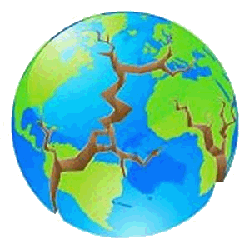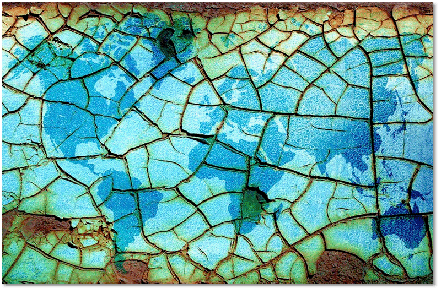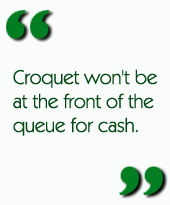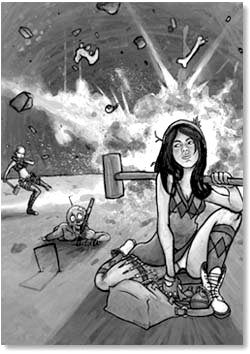

|
Back to |
| The Front Page |
| Letters & Opinion |
|
Croxit - Croquet in a post-Brexit Britain by James Hawkins layout by Reuben Edwards posted on March 6, 2020
|
||||||
|
||||||
In January the United Kingdom left the European Union. Many Brits have always been uncomfortable with Britain's relationship with the rest of the continent, but what does this departure mean for the future? Longer queues at Passport Control and face masks for shields against a new virus may be the least of the concerns of ordinary Brits. James Hawkins ponders a bleak future--for almost everyone in a newly fragmented world.
I've been reading a lot of science fiction recently. Dystopian stuff about environmental disaster and plague outbreaks. And that Twilight Zone story about the world being run by a petulant toddler who controls the minds of those who keep him in power. Right now, none of this seems fictional.

|
 Johnson, perhaps even more than Trump, is a man in need of a huge legacy project to be remembered by. For Trump it's The Most Beautiful Wall; for Johnson it seems to be the reinvention of the United Kingdom as The Great English Empire. In Post-Brexit Britain, he's such a divisive figure that his only route towards popularity is to throw around public cash like it's confetti. There are big plans for new roads, new rail networks, and new hospitals. The cash to pay for it will be magicked out of nothing, it will be a great success, and Boris will tour the streets to cheers and applause. Children will wave flags, and we'll erect huge marble statues in gratitude.
Johnson, perhaps even more than Trump, is a man in need of a huge legacy project to be remembered by. For Trump it's The Most Beautiful Wall; for Johnson it seems to be the reinvention of the United Kingdom as The Great English Empire. In Post-Brexit Britain, he's such a divisive figure that his only route towards popularity is to throw around public cash like it's confetti. There are big plans for new roads, new rail networks, and new hospitals. The cash to pay for it will be magicked out of nothing, it will be a great success, and Boris will tour the streets to cheers and applause. Children will wave flags, and we'll erect huge marble statues in gratitude.
Right now, that doesn't seem likely. Climate change has plonked a conveyor belt of storms right on top of the UK, and much of the country has been flooded for most of February: a national crisis, but the Prime Minister is nowhere to be seen. A hi-vis jacket and a hard hat look good when you're on the News at Ten touring construction sites for new hospitals; less so when you're thigh-deep in sewage in the house of a sobbing constituent.
A formula for calculating the future
So here we are. Only a month after the United Kingdom left the European Union. Floods. Coronavirus. Economic uncertainty. It's a time to have your finest minds in charge of the country. There's little indication that we do, but we'll watch and wait.

|
This all presents a huge cash squeeze on the British economy. Brexit is going to tighten its grip on all aspects of life - we're slamming the door on our trade allies and making the country a more hostile environment for migrant workers who keep much of the UK running. Boris will want to spend on big, sexy projects, but it will come at a price. More sexy rail projects + lower total income = less money for unsexy local parks and community sports.
 Maybe croquet is more insulated than many other sports. If the English Croquet Association sees funding cut from 'zero' to 'still zero', that isn't going to hurt much. But individual clubs rely on grant aid for infrastructure projects. A squeeze on grass-roots tennis or cricket or football is going to shrink the available cash for everyone to refurbish their clubhouses.
Maybe croquet is more insulated than many other sports. If the English Croquet Association sees funding cut from 'zero' to 'still zero', that isn't going to hurt much. But individual clubs rely on grant aid for infrastructure projects. A squeeze on grass-roots tennis or cricket or football is going to shrink the available cash for everyone to refurbish their clubhouses.
If all sports lose out, croquet won't be at the front of the queue for cash. It's going to be a time to roll up our sleeves and fill in the workload of maintaining clubs, which local jurisdictions can no longer afford. For many croquet clubs, that's already the case. Business as usual, perhaps.
The climate affects all the players, everywhere
Just as funding prospects wither away, our running costs will rise. Globally, the weather is becoming extreme and unpredictable. For some parts of the world, that's presented as excessive and dangerous heatwaves. British summers now seem to comprise either droughts and water rationing, or all flat land being washed away with flood water. Each event each year seems to have a 50% chance of happening, with no predictability of which is likely in any given year.

|
| Some people might think the zombies being destroyed here are Golf Croquet players. The artist, Joshua Niczynski, has given us no clue about his political philosophy, beyond a powerful comment on female empowerment. |
New Britannia presents all sorts of challenges to clubs and to the infrastructure of croquet--but what about the people who play? Brexit is a wedge that's opened a fault line down the middle of the UK. Pollsters have spent many long hours trying to understand the archetypal Leave and Remain voters. The key determinant seems to be age - the older you are, the more likely you are to lean towards being pro-Boris and anti-Europe.
Pollsters haven't done their homework on the croquet community as diligently as they have on the broader electorate. The typical croquet player is middle-aged, middle class and from somewhere in Middle England. That's the core Brexit demographic. Compare these baby boomers with the next generation we expect to carry the croquet torch towards the middle of the century.
What is the price of mere survival?
In politics, we've seen a rise in self-interest and insularity on both sides of the pond. The sense of altruism that sees people give up their time to paint the fences at the club, or cut the grass, or recruit new members - that's all to be discouraged in our buccaneering new every-man-for-himself Britain.
Croquet is a sport whose survival relies on the goodwill of volunteers. My generation (mid 40s to mid 50s) is the generation of diminished opportunities, increased debt, lower home ownership, and rising resentment.
 Give it another few years, and your committee can't spare the time to fulfill their roles. New members can't afford the time for a full day's play. And the ground manager is demanding an increased budget to cope with the unpredictable floods and droughts which now affect the playing season.
Give it another few years, and your committee can't spare the time to fulfill their roles. New members can't afford the time for a full day's play. And the ground manager is demanding an increased budget to cope with the unpredictable floods and droughts which now affect the playing season.
This is the point at which the club decides maybe to lower its standards of grass maintenance, or to stop renewing its equipment, or to offer less coaching. The members lose interest in improving and settle for tapping a ball through some rusty old hoops for half an hour before stopping for a chat. This is the way the world ends, not with a bang but a whimper.
As any science fiction geek will tell you, the array of possible futures for us is infinite. Some will say that croquet is a pursuit in terminal decline, and will lay the blame on Better Things To Do With Your Time (watching Netflix, playing Candy Crush, abusing strangers on Twitter). I don't agree - it's either a game worth playing, or it's not. What I do think, though, is that our existing model of playing croquet in clubs is in decline. We have a worsening economic outlook, and a next generation who can't guarantee a regular commitment of time.

|
Tough times are ahead. We need to recognise the bumps in the road ahead and brace ourselves for a rough ride.
James Hawkins is a former editor of the English Croquet Gazette and the author of the book "Complete Croquet." He has spent the last decade building a club in his home city of Liverpool. Starting with some disused tennis courts and a derelict clubhouse has given him expertise in fund raising, ground maintenance, and the difficulties of recruitment in the digital age.